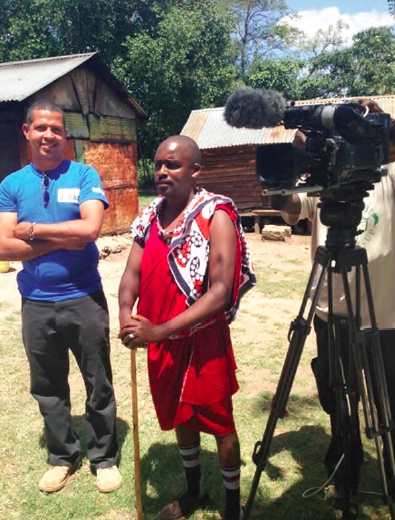Shamba Shape Up – A farm make-over TV show in East Africa
 Katharine MacMahon and Patricia Gichinga
Katharine MacMahon and Patricia Gichinga
Katharine works in the Shamba Shape Up’s communications department and supports the online following on social media.
Patricia Gichinga is the series director and production manager.
The TV series
Shamba Shape Up (SSU) is make-over style TV show produced by The Mediae Company in East Africa and funded by a range of sponsors. The show aims to give both farmers and audiences the tools they need to improve their farms (shambas). The series tackles issues such as soil fertility, livestock and poultry health as well as dietary diversity and how to maximize the nutritional value of vegetables consumed. Other relevant topics such as financial planning, solar power and harvesting rainwater are also included depending on the needs of the farmer in the episode.
Each episode focuses on one farmer and her/his farm. The SSU team, which includes a film crew and a number of experts such as veterinarians and crop specialists visit a different farm each week in a different area of the region. Typically, the film crew spends four days with each farm/household, allowing time to get the experts’ opinions and build any necessary improvement structures.
SSU’s estimated audience in the first series was around 5 million, (in Kenya) with this number estimated to rise to 10 million by the end of series 5 in the whole of East Africa. The show started its fifth series in March 2015 and includes farms across three countries; Kenya, Uganda and Tanzania.
A leaflet has been developed for each episode in each country, which provides information on the topics covered and aims to reinforce the learning on the show. Leaflets are online www.shambashapeup.com and hard copies are available by post (in Kenya) via SMS.
Continued engagement via social media
SSU is not just about the TV episodes, but also aims to continue the discussion with farmers well beyond farm visits. To do this, SSU has established an active Facebook page, with over 43,000 fans logging in to discuss the episode, ask questions and chat with other local farmers. Technical experts are tagged in questions that relate to them, allowing them to engage directly with the customer. SSU also has an active Twitter page and a blog where information on the series and from other sponsors is sent and received.
Text messaging and phone support to farmers
Recognising the thirst for agricultural information, SSU is launching iShamba, a service that farmers in Kenya can engage with to receive expert advice on their farming techniques via their cell phones. Any farmer in Kenya can join by sending the text message “JOIN” to 21606. Farmers will receive a call from one of the agronomy experts who will gather information on a farmer’s location, what is farmed, farm size, and what information the farmer would find most useful to hear about. Subscribers will then receive weekly market price information, weather forecast updates, special offers from sponsors and agriculture tips relevant to their location, for example an SMS detailing the pest risk in the farmer’s area and how best to combat it, alongside details of the best time to plant maize in a given area.
Impact
The Mediae Company monitors changes in knowledge, attitude and practice of viewers. At the end of each series, SSU commissions independent research to look into the results and changes coming about within viewers of the show. Research by the UK Reading University in 2014 found that the overall number of households reporting that they had made changes to their maize or dairy practices as a result of the programme, or who reported that they had benefited from SSU through increased profit or improved household food situation, was estimated to be 428,566. From these two enterprises, the estimated net economic impact in the 25 counties of Kenya was approximately US$24.7 million.
Farm visits and filming by Patricia Gichinga
The Shamba Shape Up (SSU) team is small, but focused. With only a few days to film an episode, we have a lot of work to do, fast. Typically, a farm (shamba) is ‘scouted’ a couple of weeks before filming starts. Scouting includes going around farmland, speaking to extension workers, partners and farmers about farms that may fit what we are looking for. Although we are fairly flexible about what we are looking for, it always needs to fit with the content needs for filming in the area. If we are lucky enough to find this, we always hope to find a young man or woman, preferably, who finds farming a better prospect than city life.
Once scouting is complete, we head up to film. We have about 2 days per farm to film the content. Filming is always great fun and people love to come watch the filming and ask questions about their own farm.
To find out more about this award-winning show, visit here or contact Anne Marie.


